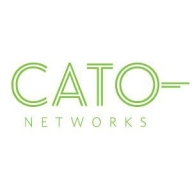


Cato SASE Cloud Platform and Forcepoint CASB compete in the cloud security category. Cato appears to have the upper hand with its comprehensive management and rapid threat response, whereas Forcepoint emphasizes application management and integration with DLP.
Features: Cato SASE Cloud Platform offers next-gen firewall capabilities, an always-on VPN for remote workers, and centralized management. Forcepoint CASB integrates well with Forcepoint DLP, offers visibility into cloud applications, and provides easy-to-use management tools.
Room for Improvement: Cato could improve its one-to-one NAT capabilities and enhance integration with identity providers other than LDAP. Forcepoint lacks comprehensive support for custom applications and should consolidate solutions like Secure Web Gateway with CASB to reduce latency. Backend stability and public cloud integration are needed improvements for Forcepoint.
Ease of Deployment and Customer Service: Cato provides deployment flexibility across hybrid, private, public, and on-premises environments with 24/7 customer support, known for its efficiency. Forcepoint is praised for its simple setup, although its support experiences could be more consistent.
Pricing and ROI: Cato's pricing is competitive but viewed as costly compared to Cisco Meraki, providing ROI through improved reliability and network maintenance savings. Forcepoint is moderately priced but offers good value for large enterprises, promising long-term ROI.



iboss offers a comprehensive security platform designed for diverse use cases such as web filtering, data loss protection, corporate proxy services, and URL filtering.
iboss integrates advanced features to address dynamic security needs, leveraging its strength in SASE, ZTNA, AI initiatives, and cloud integration, while ensuring seamless operations for remote work. It excels in historical forensics, malware protection, and flexible cloud deployments. Users benefit from comprehensive traffic scanning, robust malware detection, and PaaS capabilities that reduce hardware management. An intuitive admin console ensures efficient management with content filtering and low false positives. SSL decryption enhances security, while DLP protects data in AI conversations. Deployment is rapid and scalable, allowing effortless integration with emerging technologies.
What features does iboss offer?
What benefits and ROI should users consider?
iboss finds significant application in sectors such as education, where web filtering for K-12 is crucial, and in corporate environments requiring robust proxy services and URL filtering for network security. Its adaptability is essential in scenarios demanding flexible, decentralized security frameworks, particularly for remote work setups.
Cato Networks is a leading SASE (Secure Access Service Edge) platform, combining SD-WAN and network security to obtain a cloud-native service. Cato Networks optimizes and secures application access for users and identities. The platform delivers a next-generation secure networking architecture that minimizes legacy IT infrastructures’ complexity, costs, and risks. The goal of Cato Suite is to connect any user to any application securely and optimally.
Cato Suite runs on a private global network of more than 65 PoPs (points of presence) connected via SLA-backed network providers. The service can connect branches, data centers, users, and clouds. Cato can be deployed in stages to augment legacy network services.
Cato Suite delivers end-to-end route optimization for WAN and cloud traffic. The architecture is self-healing, enabling a high service uptime.
Cato Features
Cato Cloud has a global backbone to deliver a reliable, global network. Here are some key SD-WAN features of Cato Cloud.
What challenges does Cato Network solve?
MPLS (multi-protocol label switching) networks are usually expensive and limited in their capacity. Cato simplifies migrating to a faster, higher-capacity internet and SASE cloud. Cato SD-WAN appliances enable customers to improve usable capacity and resiliency.
Customers who suffer from the challenge of high latency and network inconsistency can use Cato to deliver a consistent connection and user experience to access on-premises and cloud applications.
Cato’s complete network security stack connects all branch locations to the Cato cloud, therefore protecting all traffic, both internet-bound and WAN, with enterprise-grade, cloud-based security services. This capability avoids having to backhaul internet traffic to a data center or hub or having to implement stand-alone cloud security solutions.
Organizations using Cato notice an acceleration of cloud traffic. Cato achieves this by routing all traffic from the edges to the PoP closest to the data center. Because of the close distance between the two, the latency is near zero.
Reviews from Real Users
An IT manager/project coordinator at a healthcare company says that “[Cato is] a cloud-based solution that integrates well with everything. They are the classic SaaS solution.”
Yeong-Gi L., a network engineer at Snetsystems, notes that “The solution is very stable. The scalability is quite good. Technical support was always helpful and responsive. The integration capabilities are not a problem at all.”
"The most valuable feature is that it also works as a next-gen firewall because it has security features," says Lorenzo S., senior solutions consultant Lead at MDI.
Forcepoint CASB (Cloud Access Security Broker) is a security solution which is designed to secure and monitor the use of cloud services within an organization. It helps organizations gain visibility and control over the cloud applications and services being used by their employees. Forcepoint CASB integrates with cloud service providers' APIs and employs various techniques such as traffic analysis, proxying, and API-based controls to provide security and visibility into cloud application usage. It can be deployed as a standalone solution or integrated with other security technologies within an organization's existing infrastructure.
Forcepoint CASB Features:
Forcepoint CASB Benefits:
Reviews from Real Users
Edwin Eze Osiago, Regional Solutions Manager (Sub-Sahara Africa) at InfodataReliable, says that Forcepoint CASB is "Easy to set up and offers good visibility".
PeerSpot user, Professional Services Coordinator at a tech vendor, writes that Forcepoint CASB "Needs better backend code, requires stronger technical support, and the initial setup should be easier" and also adds that "The most valuable aspect for us is the fact that the product seamlessly integrates with the Forcepoint DLP".
Mahendra Bedre, Lead at Infrastructure Solutions ALM, says that Forcepoint CASB's "Macro integration and IDs for credentials are great features; It is easy to use with a good layout".
We monitor all Cloud Access Security Brokers (CASB) reviews to prevent fraudulent reviews and keep review quality high. We do not post reviews by company employees or direct competitors. We validate each review for authenticity via cross-reference with LinkedIn, and personal follow-up with the reviewer when necessary.